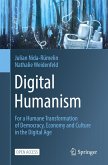Perspectives on Digital Humanism
Herausgegeben:Werthner, Hannes; Prem, Erich; Lee, Edward A.; Ghezzi, Carlo
Perspectives on Digital Humanism
Herausgegeben:Werthner, Hannes; Prem, Erich; Lee, Edward A.; Ghezzi, Carlo
- Gebundenes Buch
- Merkliste
- Auf die Merkliste
- Bewerten Bewerten
- Teilen
- Produkt teilen
- Produkterinnerung
- Produkterinnerung
This open access book aims to set an agenda for research and action in the field of Digital Humanism through short essays written by selected thinkers from a variety of disciplines, including computer science, philosophy, education, law, economics, history, anthropology, political science, and sociology. This initiative emerged from the Vienna Manifesto on Digital Humanism and the associated lecture series.
Digital Humanism deals with the complex relationships between people and machines in digital times. It acknowledges the potential of information technology. At the same time, it points…mehr
Andere Kunden interessierten sich auch für
![Perspectives on Digital Humanism Perspectives on Digital Humanism]() Perspectives on Digital Humanism30,99 €
Perspectives on Digital Humanism30,99 €![Introduction to Digital Humanism Introduction to Digital Humanism]() Introduction to Digital Humanism38,99 €
Introduction to Digital Humanism38,99 €![Digital Humanism Digital Humanism]() Julian Nida-RümelinDigital Humanism30,99 €
Julian Nida-RümelinDigital Humanism30,99 €![Introduction to Digital Humanism Introduction to Digital Humanism]() Introduction to Digital Humanism30,99 €
Introduction to Digital Humanism30,99 €![AI Ethics AI Ethics]() Mark CoeckelberghAI Ethics12,99 €
Mark CoeckelberghAI Ethics12,99 €![Ethical and Secure Computing Ethical and Secure Computing]() Joseph Migga KizzaEthical and Secure Computing41,99 €
Joseph Migga KizzaEthical and Secure Computing41,99 €![Ethics in Cyberspace Ethics in Cyberspace]() Thomas PlougEthics in Cyberspace75,99 €
Thomas PlougEthics in Cyberspace75,99 €-
-
-
This open access book aims to set an agenda for research and action in the field of Digital Humanism through short essays written by selected thinkers from a variety of disciplines, including computer science, philosophy, education, law, economics, history, anthropology, political science, and sociology. This initiative emerged from the Vienna Manifesto on Digital Humanism and the associated lecture series.
Digital Humanism deals with the complex relationships between people and machines in digital times. It acknowledges the potential of information technology. At the same time, it points to societal threats such as privacy violations and ethical concerns around artificial intelligence, automation and loss of jobs, ongoing monopolization on the Web, and sovereignty. Digital Humanism aims to address these topics with a sense of urgency but with a constructive mindset. The book argues for a Digital Humanism that analyses and, most importantly, influences thecomplex interplay of technology and humankind toward a better society and life while fully respecting universal human rights. It is a call to shaping technologies in accordance with human values and needs.
Digital Humanism deals with the complex relationships between people and machines in digital times. It acknowledges the potential of information technology. At the same time, it points to societal threats such as privacy violations and ethical concerns around artificial intelligence, automation and loss of jobs, ongoing monopolization on the Web, and sovereignty. Digital Humanism aims to address these topics with a sense of urgency but with a constructive mindset. The book argues for a Digital Humanism that analyses and, most importantly, influences thecomplex interplay of technology and humankind toward a better society and life while fully respecting universal human rights. It is a call to shaping technologies in accordance with human values and needs.
Produktdetails
- Produktdetails
- Verlag: Springer / Springer International Publishing / Springer, Berlin / Verein zur Förderung des digitalen
- Artikelnr. des Verlages: 978-3-030-86143-8
- 1st ed. 2022
- Seitenzahl: 364
- Erscheinungstermin: 24. November 2021
- Englisch
- Abmessung: 241mm x 160mm x 26mm
- Gewicht: 711g
- ISBN-13: 9783030861438
- ISBN-10: 3030861430
- Artikelnr.: 62336842
- Herstellerkennzeichnung
- Springer-Verlag GmbH
- Tiergartenstr. 17
- 69121 Heidelberg
- ProductSafety@springernature.com
- Verlag: Springer / Springer International Publishing / Springer, Berlin / Verein zur Förderung des digitalen
- Artikelnr. des Verlages: 978-3-030-86143-8
- 1st ed. 2022
- Seitenzahl: 364
- Erscheinungstermin: 24. November 2021
- Englisch
- Abmessung: 241mm x 160mm x 26mm
- Gewicht: 711g
- ISBN-13: 9783030861438
- ISBN-10: 3030861430
- Artikelnr.: 62336842
- Herstellerkennzeichnung
- Springer-Verlag GmbH
- Tiergartenstr. 17
- 69121 Heidelberg
- ProductSafety@springernature.com
¿Hannes Werthner is a retired Professor for E-Commerce at the TU Wien. From 2016 to 2019 he served also as the dean of the Faculty Prior to joining TU Wien, he had professorships at Austrian and international Universities. His research is in E-Commerce and E-Tourism, Recommender Systems, and in Network Analysis. Besides research and teaching he was and is active in starting new initiatives, such as the Vienna PhD School of Informatics. the i2c (Informatics Innovation Center), the initiative to support refugees welcome.TU.code, and recently, the Digital Humanism Initiative. Since 2011 the International Federation for IT and Tourism (IFITT) grants the "Hannes Werthner Tourism and Technology Lifetime Achievement Award" to outstanding academics and/or professionals in the field. Erich Prem is chief RTI strategy advisor and CEO of eutema GmbH. He is an internationally renowned expert in research and innovation strategy with more than two decades of work experience in research and innovation management and RTDI policy. Erich Prem is a certified managerial economist and works scientifically in artificial intelligence, research politics, innovation research and epistemology. He was a guest researcher at the Massachusetts Institute of Technology and worked at the Austrian Research Institute of AI and a lecturer at TU Vienna's Informatics Innovation Center. He received his MBA in General Management from Donau University. Edward A. Lee has been working on embedded software systems for 40 years. After studying and working at Yale, MIT, and Bell Labs, he landed at Berkeley, where he is now Professor of the Graduate School in EECS. His research is focused on cyber-physical systems. He is the lead author of the open-source software system Ptolemy II, author of textbooks on embedded systems and digital communications, and has recently been writing books on philosophical and social implications of technology. His current research is focused on a polyglot coordination language for distributed real-time systems called Lingua Franca that combines features of discrete-event modeling, synchronous languages, and actors. His recent books are The Coevolution: The Entwined Futures and Humans and Machines (2020), Plato and the Nerd: The Creative Partnership of Humans and Technology (2017), and Introduction to Embedded Systems: A Cyber-Physical System Approach (2017, with Sanjit Seshia). Carlo Ghezzi is an Emeritus Professor at Politecnico di Milano (Italy), where he has been teaching and doing research for over 40 years. He is an ACM Fellow, IEEE Fellow, member of Academia Europaea, and member of the Italian Academy of Sciences (Istituto Lombardo). He has been awarded the ACM SIGSOFT Outstanding Research Award and the Distinguished Service Award, and the IEEE TCSE Distinguished Education Award. He received the Honorary Doctorate from TU Wien. He has been President of Informatics Europe. He has been Program Co-Chair, General Chair, and program committee member of numerous international conferences. He has been Editor in Chief of the ACM Transactions on Software Engineering and Methodology, Associate Editor of Communications of the ACM, IEEE Transactions on Software Engineering, Science of Computer Programming. He has done research on programming languages and software engineering. He has published over 200 papers in international journals and conferences and co-authored 7 books. He is interested in the ethical implications of research in computer science. He is currently chairing the Ethics Committee at Politecnico di Milano.
Part 1: AI, Humans, and Control.- 1. Are We Losing Control?.- 2. Social Robots: their History and What They Can Do For Us.- 3. Artificial Intelligence and the Problem of Control.- 4. The Challenge of Human Dignity in the Era of Autonomous Systems.- Part 2: Participation and Democracy.- 5. The Real Cost of Surveillance Capitalism: Digital Humanism in the US and Europe.- 6. Democratic Discourse in the Digital Public Sphere: Re-imagining Copyright Enforcement on Online Social Media Platforms.- 7. The Internet is Dead. Long Live the Internet.- 8. Return to Freedom: Governance of Fair Innovation Ecosystems.- 9. Decolonizing Technology and Society - a Perspective from the Global South.- Part 3: Ethics and Philosophy of Technology.- 10. Digital Humanism and the Limits of AI.- 11. Explorative Experiments and Digital Humanism: Adding an Epistemic Dimension to the Ethical Debate.- 12. Digital Humanism and Global Issues in AI Ethics.- 13. Our Digital Mirror.- Part 4: Information Technology and the Arts.- 14. Fictionalizing the Robot and Artificial Intelligence.- 15. How to Be A Digital Humanist in International Relations: Cultural Tech Diplomacy Challenges Silicon Valley.- 16. We Are Needed More Than Ever. Cultural Heritage, Libraries and Archives .- 17. Humanism and the Great Opportunity of Intelligent User Interfaces for Cultural Heritage.- Part 5: Data, Algorithm, and Fairness.- 18. The Attention Economy and the Impact of AI.- 19. Did You Find It on the Internet? Ethical Complexities of Search Engine Rankings.- 20. Personalization, Fairness and Post-Userism.- Part 6: Platform Power.- 21. The Curation Chokepoint.- 22. Business Model Innovation and the Rise of Technology Giants.- 23. Scaling Up Broken Systems? Considerations from the Area of Music Streaming.- 24. The Platform Economy after Covid-19: Regulation and the Precautionary Principle.- Part 7: Education and Skills of the Future.- 25. Educational Requirements for Positive Social Robotics.- 26. Informatics as a Fundamental Discipline in General Education - The Danish Perspective.- 27. The Unbearable Disembodiedness of Cognitive Machines.- Part 8: Digital Geopolitics and Sovereignty.- 28. The Technological Construction of Sovereignty.- 29. A Crucial Decade for European Digital Sovereignty.- 30. Geo-Politics and Digital Sovereignty.- 31. Cultural Influences on AI along the New Silk Road.- 32. Geopolitics, Sovereignty in Digital Times...What's in a Word?.- Part 9: Systems and Society.- 33. Work Without Jobs.- 34. Why Don't You Do Something to Help Me? Digital Humanism: A Call for Cities to Act.- 35. Ethics or Quality of Life?.- 36. Responsible Technology Design: Conversations for Success.- 37. Navigating Through Changes of a Digital World.- Part 10: Learning From Crisis.- 38. Efficiency vs. Resilience: Lessons from COVID-19.- 39. Contact Tracing Apps: A Lesson in Societal Aspects of Technological Development.- 40. Data, Models & Decisions: How We can Shape our World by Not Predicting the Future.- 41. Lessons Learned from the Covid-19 Pandemic.- 42. The Need for Respectful Technologies: Going Beyond Privacy.- Part 11: Realizing Digital Humanism.- 43. Digital Humanism - Navigating the Tensions Ahead.- 44. Should We Rethink How We Do Research?.- 45. Interdisciplinarity: Models and Values for Digital Humanism.- 46. It Is Simple, It Is Complicated.
Part 1: AI, Humans, and Control.- 1. Are We Losing Control?.- 2. Social Robots: their History and What They Can Do For Us.- 3. Artificial Intelligence and the Problem of Control.- 4. The Challenge of Human Dignity in the Era of Autonomous Systems.- Part 2: Participation and Democracy.- 5. The Real Cost of Surveillance Capitalism: Digital Humanism in the US and Europe.- 6. Democratic Discourse in the Digital Public Sphere: Re-imagining Copyright Enforcement on Online Social Media Platforms.- 7. The Internet is Dead. Long Live the Internet.- 8. Return to Freedom: Governance of Fair Innovation Ecosystems.- 9. Decolonizing Technology and Society - a Perspective from the Global South.- Part 3: Ethics and Philosophy of Technology.- 10. Digital Humanism and the Limits of AI.- 11. Explorative Experiments and Digital Humanism: Adding an Epistemic Dimension to the Ethical Debate.- 12. Digital Humanism and Global Issues in AI Ethics.- 13. Our Digital Mirror.- Part 4: Information Technology and the Arts.- 14. Fictionalizing the Robot and Artificial Intelligence.- 15. How to Be A Digital Humanist in International Relations: Cultural Tech Diplomacy Challenges Silicon Valley.- 16. We Are Needed More Than Ever. Cultural Heritage, Libraries and Archives .- 17. Humanism and the Great Opportunity of Intelligent User Interfaces for Cultural Heritage.- Part 5: Data, Algorithm, and Fairness.- 18. The Attention Economy and the Impact of AI.- 19. Did You Find It on the Internet? Ethical Complexities of Search Engine Rankings.- 20. Personalization, Fairness and Post-Userism.- Part 6: Platform Power.- 21. The Curation Chokepoint.- 22. Business Model Innovation and the Rise of Technology Giants.- 23. Scaling Up Broken Systems? Considerations from the Area of Music Streaming.- 24. The Platform Economy after Covid-19: Regulation and the Precautionary Principle.- Part 7: Education and Skills of the Future.- 25. Educational Requirements for Positive Social Robotics.- 26. Informatics as a Fundamental Discipline in General Education - The Danish Perspective.- 27. The Unbearable Disembodiedness of Cognitive Machines.- Part 8: Digital Geopolitics and Sovereignty.- 28. The Technological Construction of Sovereignty.- 29. A Crucial Decade for European Digital Sovereignty.- 30. Geo-Politics and Digital Sovereignty.- 31. Cultural Influences on AI along the New Silk Road.- 32. Geopolitics, Sovereignty in Digital Times...What's in a Word?.- Part 9: Systems and Society.- 33. Work Without Jobs.- 34. Why Don't You Do Something to Help Me? Digital Humanism: A Call for Cities to Act.- 35. Ethics or Quality of Life?.- 36. Responsible Technology Design: Conversations for Success.- 37. Navigating Through Changes of a Digital World.- Part 10: Learning From Crisis.- 38. Efficiency vs. Resilience: Lessons from COVID-19.- 39. Contact Tracing Apps: A Lesson in Societal Aspects of Technological Development.- 40. Data, Models & Decisions: How We can Shape our World by Not Predicting the Future.- 41. Lessons Learned from the Covid-19 Pandemic.- 42. The Need for Respectful Technologies: Going Beyond Privacy.- Part 11: Realizing Digital Humanism.- 43. Digital Humanism - Navigating the Tensions Ahead.- 44. Should We Rethink How We Do Research?.- 45. Interdisciplinarity: Models and Values for Digital Humanism.- 46. It Is Simple, It Is Complicated.








